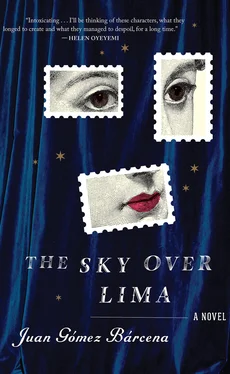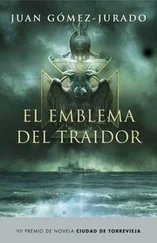Both of them pretend to be sad about the rejection, but Carlos fakes it a bit more convincingly. His expression is, as always, a flawless simulation. Sometimes, when he gets bored, he lingers in front of the mirror awhile, rehearsing different expressions — joy, disappointment, melancholy, hope. He does it so well that from time to time he has been surprised to find himself experiencing real sadness and yet unpersuaded by his own emotion reflected in the mirror.
Then, in an instant, José regains the happiness he never really lost. He slings an arm familiarly around Carlos’s shoulder and offers to buy a round.
“To Juan Ramón! We owe everything to him!” he toasts. “His letters have inspired us!”
And when he says this, he kisses the most recent wax-sealed envelope. He kisses it as a medieval pilgrim might kiss a holy relic. And he also kisses it on precisely the spot where only a few weeks earlier there lingered the greedy snout of a rat. The same rat that, on voyage after voyage, accompanies the correspondence in the hold of the transatlantic steamer.
Carlos lifts his glass to his lips, but by the time he has finished throwing back his drink, he is no longer thinking about the toast or about Juan Ramón — somehow he has started thinking about Georgina. This has been happening to him a lot lately. He finds himself thinking of her not as part of a game or as a pretext, but as someone who has a life of her own. Something akin to a distant cousin who lives in the countryside and whom we don’t see often, or a maiden whose beauty we have frequently heard described by others and with whom we hope to exchange a few words at the next ball. Sometimes he even wonders whether it is not Georgina herself, rather than Juan Ramón and his letters, who is inspiring so many of his poems about impossible loves and ethereal muses.
But he says nothing, for that, too, is a secret.
◊
“What about that nun?”
“Where?”
“Right there, right there — the one who’s walking under the archway.”
“Oh. Secondary, obviously — who the hell wants to read about a nun?”
“Also, she doesn’t look like she’s broken a plate in her life, so she’s more of a Saint John of the Cross character than a Zorrilla…”
“What about the old woman begging for alms at the church door?”
“She’s got a protagonistic look about her, doesn’t she? But a short piece, of course. A story. Twenty pages or so. At most.”
“Yes, a short story. A sad one. Very French, or maybe Russian. One of those where the main character starts out a pauper and spends the rest of the narrative sinking deeper into destitution. And those soldiers making rounds?”
“Nothing. That’s all they’re good for — making their rounds in the background. They haven’t even got a page in them.”
They’ve played the game late into the night. Slowly the electric streetlights have come on, and behind the windowpanes in the poor neighborhoods, the flames of candles and oil lamps have begun to flicker. It smells like noodles and white rice. In that building teeming with Chinese, it always smells like noodles and white rice, and sometimes a little like opium too.
“What about that pretty girl?”
“What about that little boy who’s playing?”
“What about that coachman beating his horse?”
They keep pressing each other for a long time, even after the figures passing below them have become mere formless masses onto which any sort of character can be projected. But neither seems to have any intention of moving.
At last, when all is swallowed in darkness, when there is nothing left to look at, one of them — it doesn’t matter which — asks:
“What about Georgina?”
And the other, whichever he is, doesn’t answer.
◊
But after a while this, too, becomes boring. Or at least it bores them. The craze for anonymous letters fades. Nobody cares what Juan Ramón writes to Carlos and José. Back when the two were still at Most esteemed Juan R. Jiménez , the Club Unión would be packed to the rafters to hear the letter read aloud, but by the time they reach Dear friend , there are only three or four patrons who pay any attention. At this point, Gálvez doesn’t even know what trophy to request from the poet; they have it all and yet still they have nothing. Their correspondence has become as insipid as José’s and Carlos’s poems, which were never truly admired — the two friends were tolerated at salons and readings only as a way to hear the story of Juan Ramón and Georgina.
Other novelties appear. In particular: A young journalist named Sandoval who works as a typographer for the monthly newspaper Los Parias . That in itself is already a novelty — someone among their social circle who works, even though he doesn’t need to. He always shows up at the club with his hands stained with ink from the Linotype press, and he bears that mark of humility as if it were a war medal. He also has a scar on his temple, produced, he claims, by a policeman’s nightstick during a strike, and he points to it proudly every time he talks about class conflict. He’s an anarchist. Maybe not one of those terrorists who put bombs in the Barcelona opera house, but a peaceful revolutionary, an anarchist with his feet on the ground, as he puts it, who writes articles in support of the calls for strikes from the dockworkers in El Callao and the Bread Bakers’ Union in Lima.
The people in attendance at the club, many of them members of the most elite ranks of Lima’s aristocracy, always listen respectfully to Sandoval, sometimes going so far as to applaud a little when he gets carried away talking about revolution and the collapse of capitalism. They consider him harmless, a nice fellow. They even have a vague sense that his demands might be somewhat justified, that perhaps the workers do have the right to something more than living and dying in their factories, though, truth be told, they have no idea what those workers might do instead. How would the proletariat spend their sixteen free hours a day if the eight-hour workday were implemented? In any case, the young poets at the club don’t know much about politics. They will know just as little a few years later when, one by one, they abandon poetry and step into their fathers’ places at the head of those very factories.
To make matters worse, Sandoval is writing a novel. “I said novel , yes. Never poetry,” he declared one night, almost scornfully, when someone asked him whether he might write poems. The twentieth century would be the death of verse, he added. Who gives a damn about fripperies and bourgeois sentiment when the final battle of the class war is being waged all around them? Only the wealthy experience that sort of emotion, those existential chasms and desponds, because when men have too much free time, when they do not employ their vital energy in demolishing the walls that divide them from their brothers, then all of that force is used to burrow into themselves, to grub away at themselves and finally concoct all those delicate, artificial emotions. Enough looking within, he continued haughtily, we must look beyond ourselves, because in plantations and factories across the globe there are humble men dying, dying in the flesh, not like those pansies who feel like they’re dying of emotions that, in reality, no one cares about at all. And you can be sure that this is only the beginning; now we write novels in order to speak about actions, but in time actions will speak for themselves. That is the real literature, I tell you: action, the force of events, not the words that explain those events. The true novel of the twentieth century will be written not in a garret but in the streets, amid the clamor of protests, assassination attempts, wars, revolutions. And of that novel, let it be known, we are already writing the opening chapters. Once more the room bursts into applause. Dozens of wealthy poets cheering first the death of capital, and then the death of poetry.
Читать дальше












